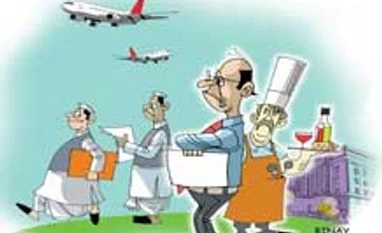This summer, it’s not the scorching sun alone that is keeping away high flyers. The election season is adding to the troubles of hotels, especially those in the metro cities. The hotels that thrive mainly on business travellers are seeing a drop in demand for the next couple of months, as most companies are withholding key decisions and are putting off big deals till a new government takes charge at the Centre and a clearer picture of India’s future emerges.
While travellers might be making a beeline for hotel bookings in cities like Varanasi or Ahmedabad — the centres of high political activity these days — it is little more than a flash in the pan for the hospitality industry. Hotel properties in cities like Delhi, Mumbai, Bangalore and other key metros are expected to see only 40-50 per cent occupancy this summer. The average rates, too, have remained stagnant at last year’s level.
According to travel website Expedia, at this point, rooms at many five-star properties in Delhi and NCR are available for anything between Rs 8,000 and Rs 8,500 a night (without taxes). Add taxes and it comes to another Rs 2,000 or so. “The benefits of elections usually go to only a few cities — and that too to budget and economy hotels. Most people are in a wait-and-watch mode. So, there is very little business travel taking place,” says Dilip Puri, managing director, Starwood Hotels and Resorts India.
Even leisure travel, which is largely limited to domestic travellers in the summer months, is not likely to bring enough cheer to luxury and upscale hotels. “Elections play a dampener, places remain closed and there are risks of violence. All these discourage vacationers,” a senior hotel industry executive says.
Besides, as the supply of hotel rooms in the country increases, the average rates will remain subdued. In the next five years, around 85,000 rooms are proposed to be added. An HVS study estimates only 60 per cent of this is under active development.
The owner of a hotel investment company says it is perhaps in the best interest of the industry that not all the proposed projects have taken off. “It gives the existing hotels the opportunity to absorb the demand and minimise the gap that is hurting many properties,” he said.
While travellers might be making a beeline for hotel bookings in cities like Varanasi or Ahmedabad — the centres of high political activity these days — it is little more than a flash in the pan for the hospitality industry. Hotel properties in cities like Delhi, Mumbai, Bangalore and other key metros are expected to see only 40-50 per cent occupancy this summer. The average rates, too, have remained stagnant at last year’s level.
According to travel website Expedia, at this point, rooms at many five-star properties in Delhi and NCR are available for anything between Rs 8,000 and Rs 8,500 a night (without taxes). Add taxes and it comes to another Rs 2,000 or so. “The benefits of elections usually go to only a few cities — and that too to budget and economy hotels. Most people are in a wait-and-watch mode. So, there is very little business travel taking place,” says Dilip Puri, managing director, Starwood Hotels and Resorts India.
More From This Section
Industry experts say the summer of 2014 might see a near-flat hotel business growth over last year, as “it cannot get any worse.” According to Veer Vijay Singh, chief operating officer, Vivanta Hotels and Resorts by Taj, “city hotels will not be very busy till the elections are over and decision making picks up. Our resort properties at destinations like Ooty, Srinagar and Goa should get us more business.”
Even leisure travel, which is largely limited to domestic travellers in the summer months, is not likely to bring enough cheer to luxury and upscale hotels. “Elections play a dampener, places remain closed and there are risks of violence. All these discourage vacationers,” a senior hotel industry executive says.
Besides, as the supply of hotel rooms in the country increases, the average rates will remain subdued. In the next five years, around 85,000 rooms are proposed to be added. An HVS study estimates only 60 per cent of this is under active development.
The owner of a hotel investment company says it is perhaps in the best interest of the industry that not all the proposed projects have taken off. “It gives the existing hotels the opportunity to absorb the demand and minimise the gap that is hurting many properties,” he said.
)